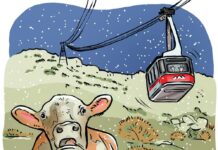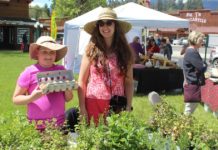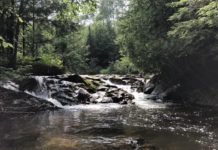Patience is something that seems to be in short supply these days, especially when thinking about the effect of the coronavirus pandemic on local communities. Many of us are searching for new ways to engage in the business of life without violating social-distancing measures.
A new thirst for outdoor activities, places where we can leave the adobe walls behind for a spell and unplug, have suddenly become in vogue. This has also put a strain on federal and state lands, among the safest places to be during the current crisis, which have been littered with trash and seen parking lots filled to capacity.
How do people make the best use of their time when so few activities outside the home are permitted? How can one enliven the experience of being human while out in nature?
Anthony Atwell seems to have an answer — one born of experience, skill and study.
Atwell, 60, is a retired real estate professional who has made New Mexico his home for 35 years. A self-described nature lover and fly fisherman, Atwell recently published a book, Fly Fish Mindset, which expresses his love of spending time among ponderosa pines, lush green meadows, mountainous terrain — and plentiful wildlife.
You might call him a fish whisperer of sorts who is intimately connected with his natural surroundings.
Atwell grew up fishing for bass in Dallas, which as he describes “is a totally different type of fishing.” He says that in comparison to fly-fishing, which he does quite regularly now, bass fishing doesn’t require as much knowledge of the environment, “especially the casting and drift,” which can often take numerous fishing trips to master.
“I think the main reason for writing the book is to create ecological awareness. The places where fish live are in the headwaters of the water we need to survive, so if we don’t take care of it, it’s going to mess things up,” he says.
The other part of writing about fly-fishing stems from his desire to encourage families to get excited about being outside. “We can just be timeless” in nature, he says, something that produces residual benefits in other areas of life. Atwell believes fly-fishing is something the whole family can enjoy, something that can be passed down to children like a precious heirloom.
Visitor traffic in local parks and wilderness areas has increased over the last few months, and many people may not hold the same appreciation for nature, something Atwell believes could be enhanced with a little more education and preparation. “A lot of people take too many fish out of the river and don’t put the little ones back. They may go over their daily limit — they don’t even know what the limit is.”
The potential harm to ecosystems arises when people are not observing regulations and leaving trash along the river banks; similarly, the chance of injury or death increases when people are not prepared for being in the outdoors. According to Atwell, preparation for journeys into the wilderness can reduce injuries both to humans and wildlife.
“Maybe an understanding of the ecology of New Mexico should be in the schools,” Atwell says.
In Fly Fish Mindset, he provides some context for the types of activities he engages in that help him become more aware of his surroundings — and why it’s important.
“I always hang out by the water before I start fishing. I find my fishing is more productive when I rig up at the river and I know what my fishing research says for recommended flies. I also know what my senses tell me once I am on the river,” he writes.
In other words, he’s already fishing before he even performs the first cast. It’s something he’s learned while studying fishing guides, other local fishermen and independent research.
“I’ve been with a lot of guides over the years … and they’ve taught me a lot about this awareness. It becomes an encyclopedia in your head.”
Simply observing an expert fishing partner in his or her natural element can provide a greater context for how to behave while out on the water. He or she may turn over rocks to see what bugs are hiding underneath. Some, he says, even scan the contents of a fish’s stomach to see what they have been eating. These are just some of the skills Atwell carries with him in his mental tackle box, and they enable him to make more informed choices about which flies to use.
Atwell’s book may be a primer for those who are less intimately connected with the sport, but it also delves into more advanced techniques that assure success on the water. He provides resources for individuals who want to learn more about entomology, the study of insects. But what is abundantly clear is his unique appreciation for the connection he has established with nature.
Atwell plans to become an outfitter who organizes higher-end, multiday trips for his guests. He will hire guides to run those trips. Plans are in the works for more books on fishing.
Also evident in his book: encouraging more women to try fly-fishing. “Women are just better listeners than men. Men tend to stomp through the water instead of just easing into the water. They don’t realize that scraping the rocks creates a vibration. You have to be aware of that.”
It’s something else to focus on in a topsy-turvy world where a lot of things don’t make much sense. Atwell believes that fly-fishing should be one of the most sought-after activities for those who seek a deeper appreciation for the many elements that make up our natural spaces.
As he writes, “I love fly fishing. It is an informed process where with every cast I learn something new about the environment. I feel energized and aware, in touch with myself and the world around me.”
The paperback version of Fly Fish Mindset is available on Amazon.
Credit: Source link































